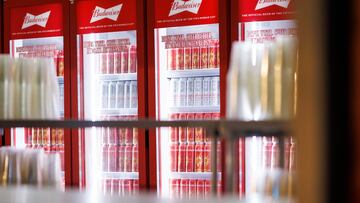Budweiser boycott: Sales continue to drop, shares down 10%, marketing execs “on leave”
Backlash against Bud Light and its parent company Anheuser-Busch continues after an attempt to widen its appeal put it at the center of the culture wars.

Generally, product boycotts have little effect on a company’s bottom-line, they cause more risk to the reputation of the brand if a lot of negative media coverage is generated. The activist pressure grabs headlines, that can push down the targeted company’s stock price getting them to change their behavior. With activists on both sides becoming more vocal, and amplified on social media Brayden King, professor of management at Kellogg School of Management has said that it might be better to simply “wait it out.”
That is what Anheuser-Busch attempted to do at first when it began facing blowback for a Bud Light marketing ploy aimed at attracting new younger consumers for the brand. On 1 April, trans TikTok influencer Dylan Mulvaney posted a video on the app of specialty Bud Light cans that had her picture on them. The firestorm that erupted and boycott of the brand have left Anheuser-Busch sales in smoldering ashes. The company’s stock value has also taken a blow and two of the executives that were behind the attempt to widen Bud Light’s appeal have been put on leave.
Bud Light sales continue to drop, stock plummets
Consumer response was swift with sales dropping as much as 10.7 percent in the first week of April. A full month and half after the onset of the controversy Bud Light sales continue to slide, now down over 28 percent as of 13 May compared to a year earlier. Sales of other Anheuser-Busch beers are being affected as well including Budweiser, Busch Light and Michelob Ultra.
Initially, Anheuser-Busch’s share value took a mild hit but the company’s response to the furor, two weeks after it commenced, expanded the malaise. In a general statement the company said: “We never intended to be part of a discussion that divides people. We are in the business of bringing people together over a beer.”
The statement drew criticism from all sides and the company has angered just about everyone. The company’s share value is down over 13 percent from where it was at the beginning of the backlash. Most of the decrease has happened since the early May.
Bud Light marketing execs “on leave”
Besides the loss in sales and the drop in the Anheuser-Busch’s stock price, the company moved to make management changes in its marketing department for Bud Light. The two executives that organized partnership with Mulvaney have been put “on leave” as the company tries to salvage the situation.
Alissa Heinerscheid, vice president of marketing for Bud Light, the first woman to hold the position in the forty-year existence of the brand, was replaced by Todd Allen. He was formerly the vice president of global marketing for Budweiser and part of a team of AB InBev executives tasked with coming up with a new plan on short order after the Qatari government banned alcohol at the World Cup at the last minute. Budweiser was an official sponsor of the soccer tournament.
Also put on leave was Daniel Blake, Heinerscheid’s boss and Budweiser’s group vice president for marketing. No one was put into his role in order to give senior marketers closer oversight on brand decisions.
Both executives have received death threats. As well as bomb threats have been called in on Anheuser-Busch facilities. Truck drivers, who work for wholesalers, with Bud Light logos on the side of their rigs have also been accosted by angry people on the streets, in stores and bars. The company has said that it will hand out $500 bonus to a wide swath company and independent wholesaler employees for the adverse situations they may have encountered due to the marketing SNAFU.






